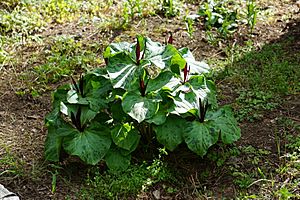Trillium angustipetalum facts for kids
Quick facts for kids Trillium angustipetalum |
|
|---|---|
 |
|
| Trillium angustipetalum blooming at Calaveras Big Trees State Park, California, USA | |
| Scientific classification |
|
| Kingdom: | Plantae |
| Clade: | Tracheophytes |
| Clade: | Angiosperms |
| Clade: | Monocots |
| Order: | Liliales |
| Family: | Melanthiaceae |
| Genus: | Trillium |
| Species: |
T. angustipetalum
|
| Binomial name | |
| Trillium angustipetalum (Torr.) J.D.Freeman
|
|
| Script error: The function "autoWithCaption" does not exist. | |
| Synonyms | |
|
Synonymy
Trillium sessile var. angustipetalum Torr.
Trillium giganteum var. angustipetalum (Torr.) R.R.Gates Trillium chloropetalum var. angustipetalum (Torr.) Munz |
|
Script error: No such module "Check for conflicting parameters".
Trillium angustipetalum, often called the narrowpetal wakerobin, is a type of plant from the Trillium group. These plants are usually part of the lily family or a newer plant family called Melanthiaceae.
Where Narrowpetal Wakerobin Grows
This plant naturally grows in northern and central California. You can also find it in southwestern Oregon. It likes to live in different kinds of places.
It grows in forests and woodlands. It also thrives in chaparral areas, which are like shrublands. You might also see it near rivers in what are called riparian zones.
You can find the narrowpetal wakerobin in the Klamath Mountains. It also lives in the foothills of the western Sierra Nevada mountains. Another place it calls home is the Outer Southern California Coast Ranges.
What Narrowpetal Wakerobin Looks Like
The narrowpetal wakerobin is a rhizomatous perennial herb. This means it's a plant that lives for many years. It also has underground stems called rhizomes.
It grows one or more straight stems. These stems can reach up to 70 centimeters (about 27 inches) tall. Each stem has a special group of three large leaves.
These leaves are usually called bracts. Each bract can be up to 25 centimeters (about 10 inches) long. They are often round or a bit oval in shape. The leaves are green and have brownish or darker green spots.
Each stem produces just one flower. This flower sits right on top of the bracts. The flower has a smell that some people don't like.
The flower has three green or red sepals. Sepals are like small leaves that protect the flower bud. It also has three narrow petals. These petals can be purple or maroon in color. They can grow up to 11 centimeters (about 4 inches) long.
 | Percy Lavon Julian |
 | Katherine Johnson |
 | George Washington Carver |
 | Annie Easley |

